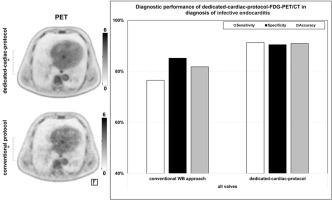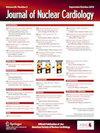Impact of a dedicated cardiac protocol on diagnosis of infective endocarditis in patients undergoing [18F]-FDG-thoracic digital-PET/CT – Effects of expertise level
IF 3
4区 医学
Q2 CARDIAC & CARDIOVASCULAR SYSTEMS
引用次数: 0
Abstract
Background
This study aimed to assess the impact of dedicated cardiac protocol (DCP) on diagnostic accuracy of state-of-the-art digital [18F]-FDG-PET/CT in infective endocarditis (IE) and the intra-individual comparison of the performance with that of conventional whole-body approach (WBA) and to analyze the effects of the expertise level of the investigators.
Methods
44 patients suspected for IE underwent digital-FDG-PET/CT after overnight fasting. Each three consultants and trainees reread PET images blinded to the examination approach and clinical information. Visual and semiquantitative analyses were performed.
Results
Digital-FDG-PET/CT with DCP revealed sensitivity, specificity, and accuracy of 89%, 93%, and 91% for native valve endocarditis (NVE) and 93%, 86%, and 91% for prosthetic valve endocarditis. Compared to WBA, substantial improvement of the diagnostic performance for NVE in DCP was evident, especially in trainees, but not as high compared to consultants. Digital-FDG-PET/CT enabled 79.5% reclassification of modified-Duke-Clinical-Criteria (mDC) with 34.1% upgrading and 45.4% downgrading.
Conclusions
This study provides new data using state-of-the-art digital-FDG-PET/CT with DCP improving the diagnostic accuracy in challenging cases of possible IE, particularly in NVE, provided that the investigators involved have the necessary expertise. These findings may have a significant impact on IE-related morbidity, mortality, and patient's management and might be meaningful for updates on the prevailing opinion regarding the value of FDG PET/CT in NVE.

专用心脏方案对接受[18F]-FDG-胸部数字 PET/CT 检查的患者诊断感染性心内膜炎的影响--专业水平的影响。
背景:本研究旨在评估专用心脏方案(DCP)对感染性心内膜炎(IE)中最先进的数字[18F]-FDG-PET/CT诊断准确性的影响,以及与传统全身方法(WBA)性能的个体内比较,并分析研究者专业知识水平的影响。每三名顾问和受训人员在对检查方法和临床信息保密的情况下重读 PET 图像。结果:结果:采用 DCP 的数字 FDG-PET/CT 对原发性瓣膜心内膜炎(NVE)的敏感性、特异性和准确性分别为 89%、93% 和 91%,对人工瓣膜心内膜炎的敏感性、特异性和准确性分别为 93%、86% 和 91%。与WBA相比,DCP对NVE的诊断率明显提高,尤其是在受训者中,但与顾问相比则没有那么高。数字 FDG-PET/CT 使修改后的杜克临床标准(mDC)的重新分类率达到 79.5%,其中 34.1%升级,45.4%降级:这项研究提供了使用最先进的数字 FDG-PET/CT 和 DCP 的新数据,只要相关研究人员具备必要的专业知识,就能提高对可能发生 IE 的疑难病例(尤其是 NVE)的诊断准确性。这些研究结果可能会对与 IE 相关的发病率、死亡率和患者管理产生重大影响,并对更新有关 FDG PET/CT 在 NVE 中的价值的主流观点具有重要意义。
本文章由计算机程序翻译,如有差异,请以英文原文为准。
求助全文
约1分钟内获得全文
求助全文
来源期刊
CiteScore
5.30
自引率
20.80%
发文量
249
审稿时长
4-8 weeks
期刊介绍:
Journal of Nuclear Cardiology is the only journal in the world devoted to this dynamic and growing subspecialty. Physicians and technologists value the Journal not only for its peer-reviewed articles, but also for its timely discussions about the current and future role of nuclear cardiology. Original articles address all aspects of nuclear cardiology, including interpretation, diagnosis, imaging equipment, and use of radiopharmaceuticals. As the official publication of the American Society of Nuclear Cardiology, the Journal also brings readers the latest information emerging from the Society''s task forces and publishes guidelines and position papers as they are adopted.

 求助内容:
求助内容: 应助结果提醒方式:
应助结果提醒方式:


